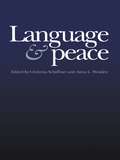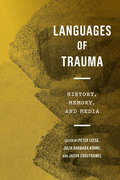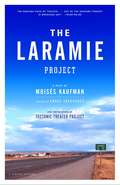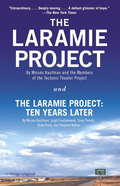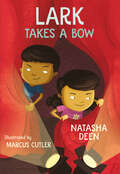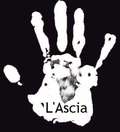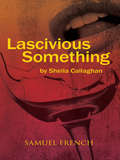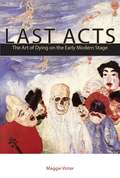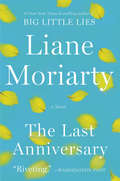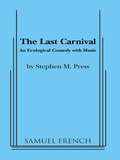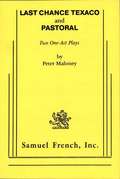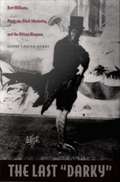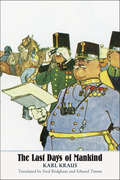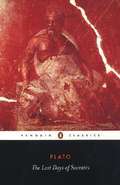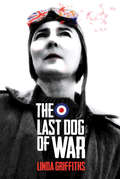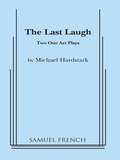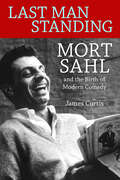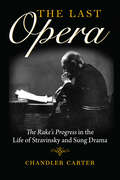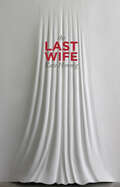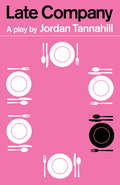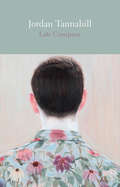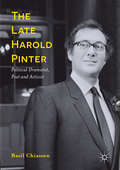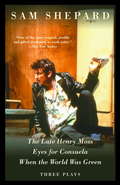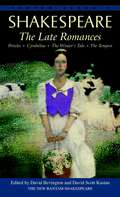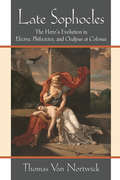- Table View
- List View
Language & Peace (War And Peace Ser. #Vol. 6)
by Christina Schäffne Anita L. WendenFirst published in 1999. Routledge is an imprint of Taylor & Francis, an informa company.
Languages of Trauma: History, Memory, and Media (G - Reference,information And Interdisciplinary Subjects Ser.)
by Peter Leese Julia Barbara Köhne Jason CrouthamelThis volume traces the distinct cultural languages in which individual and collective forms of trauma are expressed in diverse variations, including oral and written narratives, literature, comic strips, photography, theatre, and cinematic images. The central argument is that traumatic memories are frequently beyond the sphere of medical, legal, or state intervention. To address these different, often intertwined modes of language, the contributors provide a variety of disciplinary approaches to foster innovative debates and provoke new insights. Prevailing definitions of trauma can best be understood according to the cultural and historical conditions within which they exist. Languages of Trauma explores what this means in practice by scrutinizing varied historical moments from the First World War onwards and particular cultural contexts from across Europe, the United States, Asia, and Africa – striving to help decolonize the traditional Western-centred history of trauma, dissolving it into multifaceted transnational histories of trauma cultures.
The Laramie Project
by Moises KaufmanOn October 7, 1998, a young gay man was discovered bound to a fence in the hills outside Laramie, Wyoming, savagely beaten and left to die in an act of hate that shocked the nation. Matthew Shepard's death became a national symbol of intolerance, but for the people of Laramie the event was deeply personal, and it's they we hear in this stunningly effective theater piece, a deeply complex portrait of a community.
The Laramie Project and The Laramie Project: Ten Years Later
by Tectonic Theater Project Moises Kaufman Andy Paris Greg Pierotti Leigh FondakowskiOn October 7, 1998, a young gay man was discovered bound to a fence outside Laramie, Wyoming, savagely beaten and left to die in an act of brutality and hate that shocked the nation. Matthew Shepard’s death became a national symbol of intolerance, but for the people of the town, the event was deeply personal. In the aftermath, Moisés Kaufman and members of the Tectonic Theater Project went to Laramie and conducted more than 200 interviews with its citizens. From the transcripts, the playwrights constructed an extraordinary chronicle of life in the town after the murder. Since its premiere, The Laramie Project has become a modern classic and one of the most-performed theater pieces in America. <P> Now, in this expanded edition, The Laramie Project: Ten Years Later adds an essential sequel to the original work. Revisiting the town a decade after the tragedy, the troupe finds a community grappling with its legacy and its place in history. The two plays together comprise an epic and deeply moving theatrical cycle that explores the life of an American town over the course a decade.
Lark Takes a Bow (Orca Echoes #3)
by Natasha DeenMysteries seem to follow Lark and Connor Ba wherever they go, and today is no exception! The part-time detectives head to their local community theater to rehearse the play they are in, only to discover that someone is playing pranks on the theater company. The twin sleuths need to work quickly to catch the culprit before one more prank closes down the play for good. It's showtime, Lark and Connor! Lark Takes a Bow is the third title in the Lark Ba Detective series. The epub edition of this title is fully accessible.
L'Ascia
by Antonio Morcillo LopezLa violenza è presente nella nostra vita quotidiana, sui posti di lavoro, all'interno delle nostre relazioni... Due meccanici particolari di una qualsiasi officina di una qualsiasi cittadina della Spagna scoprono, all'interno dell'auto che stanno cercando di sistemare, qualcosa che cambierà le loro vite monotone e che porterà a galla il loro lato oscuro. La violenza è sempre presente nelle nostre vite quotidiane, sul lavoro, nelle relazioni e soprattutto all'interno dei media. Eventi gravi come un attacco terroristico stanno diventando il nostro pane quotidiano, rendendoci sempre più insensibili al riguardo. Lo spettacolo vuole essere uno specchio in cui lo spettatore, guardando, possa riconoscere quel lato oscuro che nessuno di noi è disposto a vedere: davvero non riusciresti ad uccidere qualcuno? Siamo davvero tutti così civili da non poter mai oltrepassare quella linea tanto sottile che ci rende terroristi? Quanta colpa hanno i media? In che misura siamo in grado di esercitare questa violenza su noi stessi?
Lascivious Something
by Sheila CallaghanCharacters: 1 male, 3 femaleSingle Set On a secluded Greek island, an American ex-pat pursues his passions: winemaking and his breathtaking young wife. Then, on the eve of Reagan's inauguration, the first tasting of the new wine is interrupted by the unexpected arrival of August's former lover. Inspired by Greek tragedy, Lascivious Something combines evocative language with sympathetic yet deeply flawed characters straight out of Euripides. "Definitely worth spending an undeniably tense evening with, right through an unexpected twist at the end." -Associated Press "Sheila Callaghan has created a great premise and fascinating characters, her writing intertwining wine and blood and sex as painful but necessary life forces." - Back Stage "Sometimes dreamlike, often shocking, Lascivious Something is at once both fraught and languorous, its most powerful moments found in the quietest revelations or silent stares. Go with an open mind and you are certain to find that your cup runneth over with ideas by the final bow." - The Collective Magazine "Callaghan, whose previous work might be described as post-feminist punk incursions into the poetic turf of early Sam Shepard, here employs a more linear narrative line to push her personal-is-political agenda." - LA Weekly "Blown Away...Honest, captivating from beginning to end. I can't recommend it enough" -CBS News
Last Acts: The Art of Dying on the Early Modern Stage
by Maggie VinterLast Acts argues that the Elizabethan and Jacobean theater offered playwrights, actors, and audiences important opportunities to practice arts of dying. Psychoanalytic and new historicist scholars have exhaustively documented the methods that early modern dramatic texts and performances use to memorialize the dead, at times even asserting that theater itself constitutes a form of mourning. But early modern plays also engage with devotional traditions that understand death less as an occasion for suffering or grief than as an action to be performed, well or badly.Active deaths belie narratives of helplessness and loss through which mortality is too often read and instead suggest how marginalized and constrained subjects might participate in the political, social, and economic management of life. Some early modern strategies for dying resonate with descriptions of politicized biological life in the recent work of Giorgio Agamben and Roberto Esposito, or with ecclesiastical forms. Yet the art of dying is not solely a discipline imposed upon recalcitrant subjects. Since it offers suffering individuals a way to enact their deaths on their own terms, it discloses both political and dramatic action in their most minimal manifestations. Rather than mournfully marking what we cannot recover, the practice of dying reveals what we can do, even in death. By analyzing representations of dying in plays by Marlowe, Shakespeare, and Jonson, alongside devotional texts and contemporary biopolitical theory, Last Acts shows how theater reflects, enables, and contests the politicization of life and death.
The Last Anniversary: A Novel
by Liane MoriartyFrom Liane Moriarty, author of the #1 New York Times bestsellers Big Little Lies and Truly Madly Guilty, comes an unforgettable novel defined by her signature sharp wit, page-turning storyline, and lovable and eccentric characters.Sophie Honeywell always wondered if Thomas Gordon was the one who got away. He was the perfect boyfriend, but on the day he was going to propose, she broke his heart. A year later he married his travel agent, while Sophie has been mortifyingly single ever since. Now Thomas is back in her life because Sophie has unexpectedly inherited his aunt Connie's house on Scribbly Gum Island—home of the famously unsolved Munro Baby mystery.Sophie moves onto the island and begins a new life as part of an unconventional family, where it seems everyone has a secret. Grace, a beautiful young mother, is feverishly planning a shocking escape from her perfect life. Margie, a frumpy housewife, has made a pact with a stranger, while dreamy Aunt Rose wonders if maybe it's about time she started making her own decisions.As Sophie's life becomes increasingly complicated, she discovers that sometimes you have to stop waiting around—and come up with your own fairy-tale ending.
Last Carnival
by Stephen M. PressEcological comedy with music / 6 or more actors to play over 15 characters / Unit set / Everything at carnival Earth is run by Carny who only cares about fun and a good show. Performers include Paul Bunyan, Buffalo Bill, John Henry, Robert Fulton and Faustus who will sell you anything-- from the Big Bomb to a cure for dandruff! Endangered species are mowed down at The Shooting Gallery and the Redwood Forests can be lost at the Wheel of Fortune. Other characters include the speedway Devil Driver, the Rotten Roll Band, Filthy Flora whose ectocyst act will surprise you, and the one who knows all-- Miriam the Mentalist. All perform and pollute the earth, but it's done with crazy comedy and famous music. Who cares about tomorrow!? Ask the kid who comes to the carnival. / "Haunting, magical, timeless and entertaining.... As you enter the strange world of this play, be prepared to be hustled, amused, shocked and enlightened."-- Taconic Newspapers.
Last Chance Texaco/Pastoral
by Peter MaloneyDrama / 3f / Interior / Originally staged to acclaim at NY's Ensemble Studio Theatre, this is a haunting, lyrical play set in a gas station run by a mother and daughter in a small Texas town. Late one night, a city woman has a flat. Her unusual life intersects with theirs as they fix her tire. This gripping piece of theatre is an excellent source of monologue and scene material. Published with Pastoral.
The Last "Darky": Bert Williams, Black-On-Black Minstrelsy, and the African Diaspora
by Louis Chude-SokeiThe Last "Darky" establishes Bert Williams, the comedian of the late nineteenth century and early twentieth, as central to the development of a global black modernism centered in Harlem's Renaissance. Before integrating Broadway in 1910 via a controversial stint with the Ziegfeld Follies, Williams was already an international icon. Yet his name has faded into near obscurity, his extraordinary accomplishments forgotten largely because he performed in blackface. Louis Chude-Sokei contends that Williams's blackface was not a display of internalized racism nor a submission to the expectations of the moment. It was an appropriation and exploration of the contradictory and potentially liberating power of racial stereotypes. Chude-Sokei makes the crucial argument that Williams's minstrelsy negotiated the place of black immigrants in the cultural hotbed of New York City and was replicated throughout the African diaspora, from the Caribbean to Africa itself. Williams was born in the Bahamas. When performing the "darky," he was actually masquerading as an African American. This black-on-black minstrelsy thus challenged emergent racial constructions equating "black" with African American and marginalizing the many diasporic blacks in New York. It also dramatized the practice of passing for African American common among non-American blacks in an African American-dominated Harlem. Exploring the thought of figures such as Booker T. Washington, W. E. B. Du Bois, Marcus Garvey, and Claude McKay, Chude-Sokei situates black-on-black minstrelsy at the center of burgeoning modernist discourses of assimilation, separatism, race militancy, carnival, and internationalism. While these discourses were engaged with the question of representing the "Negro" in the context of white racism, through black-on-black minstrelsy they were also deployed against the growing international influence of African American culture and politics in the twentieth century.
The Last Days of Mankind
by Karl Kraus Edward Timms Fred BridghamOne hundred years after Austrian satirist Karl Kraus began writing his dramatic masterpiece, "The Last Days of Mankind "remains as powerfully relevant as the day it was first published. Kraus's play enacts the tragic trajectory of the First World War, when mankind raced toward self-destruction by methods of modern warfare while extolling the glory and ignoring the horror of an allegedly "defensive" war. This volume is the first to present a complete English translation of Kraus's towering work, filling a major gap in the availability of Viennese literature from the era of the War to End All Wars. Bertolt Brecht hailed "The Last Days" as the masterpiece of Viennese modernism. In the apocalyptic drama Kraus constructs a textual collage, blending actual quotations from the Austrian army's call to arms, people's responses, political speeches, newspaper editorials, and a range of other sources. Seasoning the drama with comic invention and satirical verse, Kraus reveals how bungled diplomacy, greedy profiteers, Big Business complicity, gullible newsreaders, and, above all, the sloganizing of the press brought down the Austro-Hungarian Empire. In the dramatization of sensationalized news reports, inurement to atrocities, and openness to war as remedy, today's readers will hear the echo of the fateful voices Kraus recorded as his homeland descended into self-destruction.
The Last Days of Socrates: Euthyphro - The Apology - Crito - Phaedo
by Plató Hugh Tredennick Harold TarrantThe trial and condemnation of Socrates on charges of heresy and corrupting young minds is a defining moment in the history of Classical Athens. In tracing these events through four dialogues, Plato also developed his own philosophy, based on Socrates' manifesto for a life guided by self-responsibility. Euthyphrofinds Socrates outside the courthouse, debating the nature of piety, while The Apologyis his robust rebuttal of the charges of impiety and a defence of the philosopher's life. In the Crito, while awaiting execution in prison, Socrates counters the arguments of friends urging him to escape. Finally, in the Phaedo, he is shown calmly confident in the face of death, skilfully arguing the case for the immortality of the soul. Hugh Tredennick's landmark 1954 translation has been revised by Harold Tarrant, reflecting changes in Platonic studies, with an introduction and expanded introductions to each of the four dialogues.
The Last Dog of War
by Linda GriffithsIn 2005 Linda made a trip with her father to the last reunion of his RAF comrades, the 49th Squadron, Bomber Command. Intertwining her father’s experiences of a long-ago war with the war between a father and daughter, Linda Griffiths unveils an emotional chronicle of a family navigating a familiar yet foreign relationship.
Last Laugh
by Michael Hardstack4m, 1f / Umbrella title for two One-Act Plays by Michael Hardstark, based on the works of Anton Chekhov - The Cure and In the Cemetery.
Last Man Standing: Mort Sahl and the Birth of Modern Comedy
by James CurtisA Times Literary Supplement 2017 Book of the YearOn December 22, 1953, Mort Sahl (1927–2021) took the stage at San Francisco's hungry i and changed comedy forever. Before him, standup was about everything but hard news and politics. In his wake, a new generation of smart comics emerged—Shelley Berman, Mike Nichols and Elaine May, Lenny Bruce, Bob Newhart, Dick Gregory, Woody Allen, and the Smothers Brothers, among others. He opened up jazz-inflected satire to a loose network of clubs, cut the first modern comedy album, and appeared on the cover of Time surrounded by caricatures of some of his frequent targets such as Dwight Eisenhower, Richard Nixon, Adlai Stevenson, and John F. Kennedy. Through the extraordinary details of Sahl's life, author James Curtis deftly illustrates why Sahl was dubbed by Steve Allen as “the only real political philosopher we have in modern comedy.”Sahl came on the scene the same year Eisenhower and Nixon entered the White House, the year Playboy first hit the nation's newsstands. Clad in an open collar and pullover sweater, he adopted the persona of a graduate student ruminating on current events. “It was like nothing I'd ever seen,” said Woody Allen, “and I've never seen anything like it after.” Sahl was billed, variously, as the Nation's Conscience, America's Only Working Philosopher, and, most tellingly, the Next President of the United States. Yet he was also a satirist so savage the editors of Time once dubbed him “Will Rogers with fangs.”Here, for the first time, is the whole story of Mort Sahl, America's iconoclastic father of modern standup comedy. Written with Sahl's full cooperation and the participation of many of his friends and contemporaries, it delves deeply into the influences that shaped him, the heady times in which he soared, and the depths to which he fell during the turbulent sixties when he took on the Warren Commission and nearly paid for it with his career.
The Last Opera: <I>The Rake’s Progress</I> in the Life of Stravinsky and Sung Drama (Russian Music Studies)
by Chandler CarterFrom the fall of 1947 through the summer of 1951 composer Igor Stravinsky and poet W. H. Auden collaborated on the opera The Rake’s Progress. At the time, their self-consciously conventional work seemed to appeal only to conservative audiences. Few perceived that Stravinsky and Auden were confronting the central crisis of the Modern age, for their story of a hapless eighteenth-century Everyman dramatizes the very limits of human will, a theme Auden insists underlies all opera. In The Last Opera, Chandler Carter weaves together three interlocking stories. The central and most detailed story explores the libretto and music of The Rake’s Progress. The second positions the opera as a focal point in Stravinsky's artistic journey and those who helped him realize it—his librettists, Auden and Chester Kallman; his protégé Robert Craft; and his compatriot, fellow composer, and close friend Nicolas Nabokov. By exploring the ominous cultural landscape in which these fascinating individuals lived and worked, the book captures a pivotal twenty-five-year span (from approximately 1945 to 1970) during which modernists like Stravinsky and Auden confronted a tectonic disruption to their artistic worldview. Ultimately, Carter reveals how these stories fit into a larger third narrative, the 400-year history of opera. This richly and lovingly contextualized study of The Rake’s Progress sheds new light on why, despite the hundreds of musical dramas and theater pieces that have been written since its premier in 1951, this work is still considered the "the last opera."
The Last Wife
by Kate HennigKate Parr is smart, confident, and passionate: a rising star in a world of intense competition. But her obligatory marriage to Henry is rife with the threat of violence and the lure of deceit; her secret liaisons with Thom, her husband’s former brother-in-law, could send her to an early grave; and her devotion to the education and equal rights of Henry’s daughters is putting an even bigger strain on her marriage. Does Kate risk her life to gain authority in both her relationship and her political career? Which love will she be led to if she follows her heart? And what kind of future is there for her children if she makes a crucial mistake?
Late Company
by Jordan TannahillOne year after the suicide of their teenage son Joel, Debora and Michael Shaun-Hastings sit down to dinner with their son’s bully and his parents. Closure is on the menu, but accusations are the main course as everyone takes a turn in the hot seat for their real or imagined part in the tragedy. Blame shifts over the course of the evening from one person to the next, and questions are raised that no one is prepared to answer.
Late Company: Second Edition
by Jordan TannahillOne year after the suicide of their teenage son Joel, Debora and Michael Shaun-Hastings sit down to dinner with their son’s bully and his parents. Closure is on the menu, but accusations are the main course as everyone takes a turn in the hot seat for their real or imagined part in the tragedy. Blame shifts over the course of the evening from one person to the next, raising questions no one is prepared to answer.
The Late Harold Pinter
by Basil ChiassonThis volume is the first to provide a book-length study of Pinter's overtly political activity. With chapters on political drama, poetry, and speeches, it charts a consistent tension between aesthetics and politics through Pinter's later career and defines the politics of the work in terms of a pronounced sensory dimension and capacity to affect audiences. The book brings to light unpublished letters and drafts from the Pinter Archive in the British Library and draws his political poems and speeches, which have previously been overshadowed by his plays, into the foreground. Intended for students, instructors, and researchers in drama and theatre, performance studies, literature, and media studies, this book celebrates Pinter's later life and work by discerning a coherent political voice and project and by registering the complex ways that project troubles the divide between aesthetics and politics.
The Late Henry Moss, Eyes for Consuela, When the World Was Green: Three Plays
by Sam ShepardThese three plays by Pulitzer Prize winner Sam Shepard are bold, explosive, and ultimately redemptive dramas propelled by family secrets and illuminated by a searching intelligence. In The Late Henry Moss--which premiered in San Francisco, starring Sean Penn and Nick Nolte--two estranged brothers confront the past as they piece together the drunken fishing expedition that preceded their father's death. In Eyes for Consuela, based on Octavio Paz's classic story "The Blue Bouquet," a vacationing American encounters a knife-toting Mexican bandit on a gruesome quest. And in When the World Was Green, cowritten with Joseph Chaikin, a journalist in search of her father interviews an old man who resolved a generations-old vendetta by murdering the wrong man. Together, these plays form a powerful trio from an enduring force in American theater.
The Late Romances: Pericles, Cymbeline, The Winter's Tale, The Tempest
by William ShakespeareThe first of Shakespeare's late romances moves spectacularly from one dramatic period to another as the hero, Pericles, sails off to adventure and love, and experiences what for him is a miracle. Cymbeline: A favorite romantic drama, this play of a wife unjustly accused of faithlessness moves from a world of intrigue and slander to one of reconciliation and forgiveness, and contains two of Shakespeare's most poignantly beautiful songs. The Winter's Tale: From a darkly melodramatic beginning to a joyous pastoral ending, this romance of a jealous king and his long-suffering queen is superb entertainment, with revelations, plot twists, and a final compelling theatrical moment of discovery. The Tempest: This tale of the exiled Duke of Milan, marooned on an enchanted island, is so richly filled with music and magic, romance and comedy, that its theme of love and reconciliation offers a splendid feast for the senses and the heart.
Late Sophocles: The Hero’s Evolution in Electra, Philoctetes, and Oedipus at Colonus
by Thomas Van NortwickOnly a few plays by Sophocles--one of the great tragic playwrights from Classical Athens--have survived, and each of them dramatizes events from the rich store of myths that framed literature and art. Sophocles' treatment evokes issues that were vividly contemporary for Athenian audiences of the Periclean age: How could the Athenians incorporate older, aristocratic ideas about human excellence into their new democratic society? Could citizens learn to be morally excellent, or were these qualities only inherited? What did it mean to be a creature who knows that he or she must die? Late Sophocles traces the evolution of the Sophoclean hero through the final three plays, Electra, Philoctetes, and Oedipus at Colonus. The book's main thesis, that Sophocles reimagined the nature of the tragic hero in his last three works, is developed inductively through readings of the plays. This balanced approach, in which a detailed argument about the plays is offered in a format accessible to nonspecialists, is unusual--perhaps unique--in contemporary Classical scholarship on Sophocles. This book will appeal to nonspecialist readers of serious literature as well as scholars of classical and other literatures. While including ample guidance for those not familiar with the plays, Late Sophocles goes beyond a generalized description of "what happens" in the plays to offer a clear, jargon-free argument for the enduring importance of Sophocles' plays. The argument's implications for longstanding interpretational issues will be of interest to specialists. All Greek is translated.
